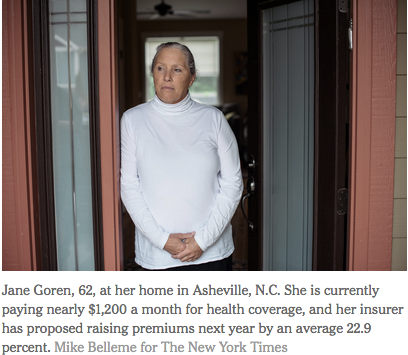North Carolina has more than 300,000 people benefiting from these “cost-sharing” subsidies, which reimburse insurers for absorbing the deductibles and co-payments of low-income customers. The Affordable Care Act requires that these customers’ out-of-pocket costs be lowered one way or another. If the federal government stops reimbursing insurers, many insurers have said they will make up for it by raising premiums.
Paradoxically, that will primarily hurt not poor customers but millions of middle-class people like the Gorens, who earn too much to qualify for premium assistance under the law and will bear the full brunt of any rate increase.k.
Across the nation, individual market customers like them are seeing signs of big premium increases, which insurers are largely attributing to the possibility of losing the federal cost-sharing subsidies and of Mr. Trump’s not enforcing the health law’s mandate that most people have coverage or pay a penalty. Mr. Trump has repeatedly pointed to such increases as signs that the markets are in “a death spiral” and to bolster support as the Republican Senate leadership rushes to vote on a bill to repeal and replace the Affordable Care Act next week.




